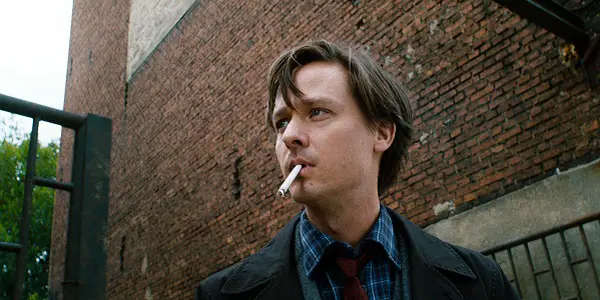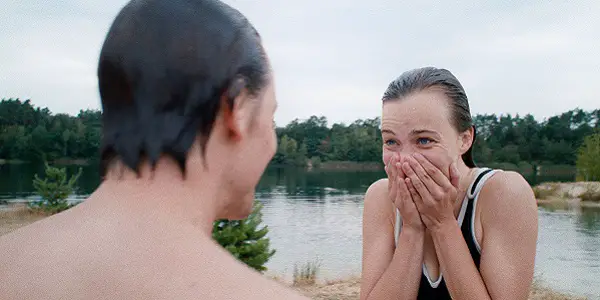FABIAN: GOING TO THE DOGS: The Downward Spiral

Lee Jutton has directed short films starring a killer toaster,…
Acclaimed German author Erich Kästner primarily wrote for younger audiences, but he did publish one major adult novel during his lifetime, a semi-autobiographical story dubbed Fabian: The Story of a Moralist. Despite several racy passages being cut before its original publication in 1931, the book was still burned as “degenerate” and “pornographic” by the Nazis in 1933; the complete and unabridged novel did not appear until 2013, under the title Kästner originally intended for it: Der Gang vor den Hunde, or Going to the Dogs.
Kästner’s tale of a young writer in the Weimar Republic who sees his life and career unraveling parallel to the Nazis’ rise to power has now been adapted to the screen by German filmmaker and cultural critic Dominik Graf. Starring two of Germany’s most compelling actors in Tom Schilling (A Coffee in Berlin) and Albrecht Schuch (System Crasher), along with rising star Saskia Rosendahl (Lore), Fabian: Going to the Dogs is a sprawling tale of hedonism and heartbreak set during one of the most infamous periods of upheaval in European history.
Highway to Hell
Jakob Fabian (Schilling) is an aspiring author from Dresden who spends his days writing advertising copy for a cigarette company and his nights frequenting the wild clubs and cabarets of Berlin. His closest friend is Stephan Labude (Schuch), an academic from exceptional economic privilege who is nonetheless on the verge of a breakdown following the dissolution of his engagement and the submission of his thesis. Bitter and nihilistic from his experiences in the Great War, Fabian moves through the world with an attitude of ironic detachment that is in stark contrast with the idealistic engagement of Labude, an outspoken Communist in a world that grows more and more dangerous by the day for anyone whose political beliefs fall remotely on the left.

One night, Fabian meets a beautiful young barmaid named Cornelia (Rosendahl). A law student who specializes in international film law, Cornelia is currently working for a film studio as a legal trainee—but what she really wants is to be an actress. The two of them happen to be neighbors in the same rundown building, and soon they have fallen madly in love, despite Cornelia declaring herself done with men.
During the halcyon days of their relationship, Cornelia asks Fabian to sign a contract, promising to never stand in the way of her career; he does so willingly, but all too soon, things go awry. Fabian loses his job, joining the seas of unemployed that are drowning Berlin in economic anxiety, their desperation helping pave the way for the Nazis’ to rise to power. Then, he learns that Cornelia is having an affair with an older producer who has promised to make her a star. Unfortunately, as Cornelia’s prospects brighten, Fabian’s continue to grow darker—and so do those of the Weimar Republic.
Appetite for Destruction
The lurid world of Fabian: Going to the Dogs will feel familiar to anyone who has previously enjoyed Weimar-era entertainment. From Fassbinder’s epic adaptation of Berlin Alexanderplatz to the popular television series Babylon Berlin, the unbridled hedonism and increasingly dangerous atmosphere of Germany just prior to Hitler’s ascension to power in 1933 continues to provide ample inspiration for writers and filmmakers, while audiences remain in awe of its “anything goes” attitude, rife with sex and drugs and crime. Unfortunately, it also feels alarmingly prescient in a world that is currently experiencing another period of intense political and economic upheaval; modern society is plagued with so many of the stresses of the Weimar era without as many of the escapes.
So, it’s no wonder that Fabian: Going to the Dogs would find its way to the screen now, more than 90 years after the novel was first published. Graf, an advocate for the thrills of genre cinema and frequent director of German crime dramas Tatort and Polizeiruf 110, takes a wildly inventive approach to the story that in many ways echoes the work of Fassbinder in its usage of unusual storytelling techniques. Winner of the Golden Lolas for Best Cinematography and Best Editing (and the Silver Lola for Best Film, as the runner-up to Maria Schrader’s I’m Your Man) at the German Film Awards, Fabian: Going to the Dogs is a vibrant collage of sounds and images that at first glance seems haphazard but is in fact incredibly fine-tuned to the tale at hand.

Beginning underground in the tunnels of the modern German subway system before ascending into the bright sunlight of the past, Fabian: Going to the Dogs makes it clear off the bat that the Weimar era is not as far removed from today as we might think. From there, Graf employs multiple narrators, experimental camerawork that includes some sequences shot on gritty, grainy Super 8 and others containing multiple frames-within-a-frame, and rapid-fire flashbacks of stray moments that linger in Fabian’s mind like ghosts. Other signposts of present-day Berlin, including the brass Stolpersteine set in the sidewalks to commemorate the victims of the Nazis, are glimpsed throughout the film, reminding us that the lines between past, present, and future are often frighteningly ambiguous. The overall effect is one of cinematic chaos, but one that perfectly suits this particular story and the time period in which it is set.
Our guide into this chaotic world is Tom Schilling, without whom Graf says he probably could not have made the film. And anyone who has previously seen Schilling as an aimless young loner in A Coffee in Berlin or an emotionally tortured soldier in Generation War can easily see why he would be the first and only choice to embody such a complex character as Jakob Fabian: someone intelligent but plagued by doubts, skeptical yet still morally astute. He is matched toe to toe by Albrecht Schuch as the lovable Labude; their clever verbal sparring is a ray of light in the dark, grimy world of the film. The lovely Saskia Rosendahl is also remarkable, ensuring that the plucky Cornelia remains a sympathetic character even as she breaks Fabian’s heart.
The supporting characters, including Meret Becker (Tatort) as a sexually and economically liberated woman whose wild lifestyle basically embodies the Weimar era (and whose advances Fabian must repeatedly resist), are almost too many, and flit in and out of the film faster than a sugar cube melts in a glass of absinthe. Yet the chemistry of the three leads keeps you deeply invested in Fabian: Going to the Dogs even as the film, which clocks in at a whopping 176 minutes, grows increasingly bleak and unpleasant. Indeed, one is left with a sense of the inevitable as the film winds its way to the tragic conclusion that one expects from nearly every Weimar-era story. The fate of Fabian mirrors that of his country; both are doomed, their inability to adapt to and anticipate a changing world guaranteeing their own self-destruction.
Conclusion:
While elements of the setting and story may feel hauntingly familiar, Fabian: Going to the Dogs is a striking, singular film nonetheless.
What do you think? What’s your favorite Weimar-era story? Share your thoughts in the comments below.
Fabian: Going to the Dogs opens in New York on February 11, 2022 and in Los Angeles on March 4, 2022. You can find more international release dates here.
Watch Fabian: Going to the Dogs
Does content like this matter to you?
Become a Member and support film journalism. Unlock access to all of Film Inquiry`s great articles. Join a community of like-minded readers who are passionate about cinema - get access to our private members Network, give back to independent filmmakers, and more.
Lee Jutton has directed short films starring a killer toaster, a killer Christmas tree, and a not-killer leopard. Her writing has appeared in publications such as Film School Rejects, Bitch: A Feminist Response to Pop Culture, Bitch Flicks, TV Fanatic, and Just Press Play. When not watching, making, or writing about films, she can usually be found on Twitter obsessing over soccer, BTS, and her cat.













